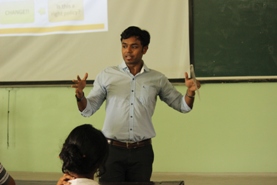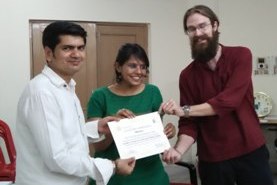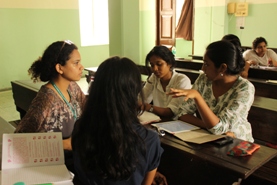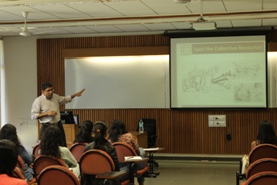



Despite 67 years of political independence and democracy, India still lacks economic freedom. Indians are throttled by age old socio-cultural practices that stifle individual liberty, the license-permit quota raj that still exists for the poor, and ill-informed public policies that curtail entrepreneurship, restrict opportunities for growth, and stunt economic development.
Liberalism and capitalism are often seen as western concepts—ideas that we are borrowing from them which have no roots in our history and are incompatible with our culture. This is primarily because the curriculum in schools and universities across the country lack introduction to these ideas, and focus only on socialist and mixed-economy policies. Growing up with exposure only to a single set of ideas, when people are introduced to ideas of liberalism and capitalism, they find them alien and unviable. In offering public policy credit courses, we are facilitating the creation of a marketplace of ideas, offering an alternative to the conventional curriculum being taught in educational institutions.
The approach of our academic credit-based module is based on ‘comparative institutions analysis.’ In other words the course won’t tell students how to solve people’s specific day-to-day problems. As a course on public policy, it will help them examine how to think about the ‘general framework’ ‘within which’ people solve problems in society.
With an emphasis on first principles, the course encourages students to think critically about social, economic, and political issues and asks fundamental questions on what makes a ‘free and just society’. It further highlights the importance of sound public policy and the role of robust institutions in driving the country’s growth.
We currently offer the following modules:
- Law and Public Policy: This course goes beyond teaching on the adjudication of law-- to a discussion on the law itself, and whether its application results in justice. The intersection of the fields of law and economics helps to both define justice in terms of efficiency, and to predict the effects of legal rules, and is an excellent tool to analyse law.
- Economics and Public Policy: Offering a more holistic approach to the study of economic theory, this module explores basic economic theory in Keynesian, as well as the Chicago and Austrian Economic schools of thought. The intersection of economics and public policy helps to understand both--the role policy plays in creating a conducive environment for economic growth, and the role individuals play in shaping policy.
- Business and Public Policy: While Business Studies courses in India sufficiently explore economic and management concepts, our module shifts focus to the policy landscape that creates the ecosystem within which businesses function, and the role business-owners play in shaping policy.
- Media and Public Policy: The module on Media and Public Policy emphasises the role of journalists and the media in creating a marketplace of ideas. Through an exploration of the intersection of these two fields, the aim is to instill tools to better understand and evaluate the effects of public policies in our day to day functioning and the role of media in shaping public policy.
- Engineering and Public Policy: Engineering students in India are exposed solely to courses in their area of technical expertise, however a number of them are involved in developing technology for social development initiatives. Our module addresses the intersection of social entrepreneurship and policy.
PAST PROGRAMS
- Economics and Public Policy, Pandit Deendayal Upadhyay Petroleum University, Gandhinagar | February 2016 | Program Schedule
- Law and Public Policy, National Law of India University, Bangalore | January 2016 | Program Schedule
- Economics and Public Policy, St. Xavier’s College, Mumbai | July 2015 | Program Schedule
- Law and Public Policy, National University of Juridical Sciences, Kolkata | February 2015 | Program Schedule

